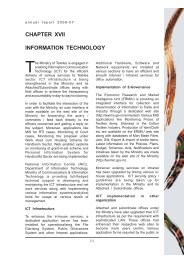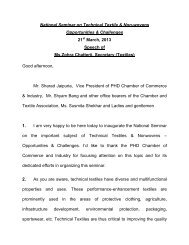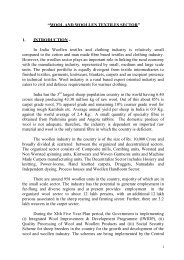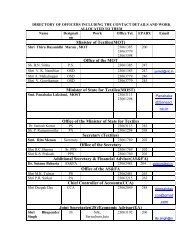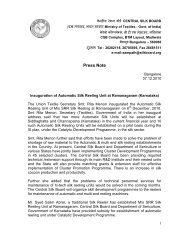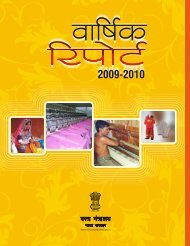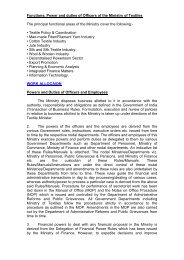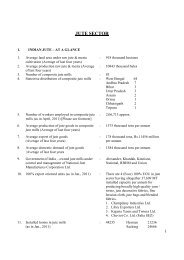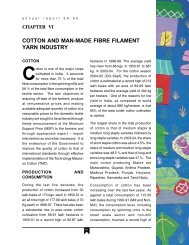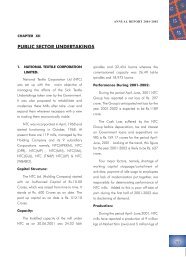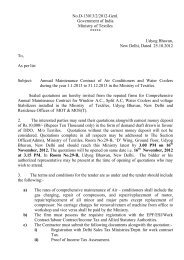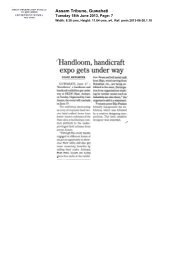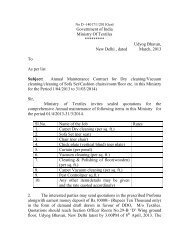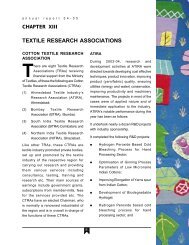FUNCTIONS & ORGANISATIONAL SET UP - Ministry of Textiles
FUNCTIONS & ORGANISATIONAL SET UP - Ministry of Textiles
FUNCTIONS & ORGANISATIONAL SET UP - Ministry of Textiles
Create successful ePaper yourself
Turn your PDF publications into a flip-book with our unique Google optimized e-Paper software.
ANNUAL REPORT 2002-2003CHAPTER II<strong>FUNCTIONS</strong> & <strong>ORGANISATIONAL</strong> <strong>SET</strong> <strong>UP</strong>The <strong>Ministry</strong> <strong>of</strong> <strong>Textiles</strong> is responsible for policy formulation, planning, development exportpromotion and trade regulation. Thisincludes all natural and manmadecellulosic fibres that go into the making <strong>of</strong>textiles, clothing and handicrafts. However,it does not deal with non-cellulosicsynthetic fibres and filament yarns, suchas nylon, polyster acrylic and polypropylene.Developmental activities <strong>of</strong> the <strong>Ministry</strong> areoriented towards making adequatequantities <strong>of</strong> raw material available to allsectors <strong>of</strong> the textile industry andaugmenting the production <strong>of</strong> fabrics atreasonable prices from the organised anddecentralised sectors <strong>of</strong> the industry.Towards this objective the <strong>Ministry</strong> laysdown guidelines for a planned andharmonious growth <strong>of</strong> various sectors <strong>of</strong>the industry. Special emphasis is given tothe development <strong>of</strong> handloom sector inview <strong>of</strong> its large employment potential. The<strong>Ministry</strong> monitors the techno-economicstatus <strong>of</strong> the industry and providesrequisite policy frame work formodernisation and rehabilitation. The<strong>Ministry</strong> coordinates the activities <strong>of</strong><strong>Textiles</strong> Research Associations and lendsfinancial support to them for undertakingresearch and development activities.The <strong>Ministry</strong> <strong>of</strong> <strong>Textiles</strong> is headed by aSecretary who is assisted in the discharge<strong>of</strong> his duties by 4 Joint Secretaries, anEconomic Advisor and the DevelopmentCommissioners for Handlooms andHandicrafts, Textile Commissioner andJute Commissioner.The principal functional areas <strong>of</strong> the<strong>Ministry</strong> cover the following:-●●●●●●●●●●●Textile Policy & CoordinationMan-made Fiber/Filament YarnIndustryCotton Textile IndustryJute IndustrySilk and Silk Textile Industry.Wool & Woolen IndustryDecentralised Powerloom SectorExport PromotionPlanning & Economic AnalysisIntegrated Finance MattersInformation Technology.1. ATTACHED OFFICES(i) Office <strong>of</strong> the DevelopmentCommissioner for HandloomsThis Office is headed by the DevelopmentCommissioner for Handlooms. Itadministers various schemes for thepromotion and development <strong>of</strong> thehandloom sector and has been providingassistance to handloom weavers in avariety <strong>of</strong> ways. Its subordinate <strong>of</strong>fices17
MINISTRY OF TEXTILEinclude Weavers’ Service Centres, IndianInstitutes <strong>of</strong> Handloom Technology and theEnforcement Machinery forImplementation <strong>of</strong> Handloom (Reservation<strong>of</strong> Articles for Production) Act., 1985.(ii) Office <strong>of</strong> the DevelopmentCommissioner for HandicraftsThis <strong>of</strong>fice is headed by the DevelopmentCommissioner for Handicrafts, whichfunctions for promotion & export <strong>of</strong>handicrafts. The Office assists the StateGovernments in planning and execution <strong>of</strong>development schemes for handicrafts. Ithas 6 regional <strong>of</strong>fices at Mumbai, Kolkata,Lucknow, Chennai, Guwahati and NewDelhi.2. SUBORDINATE OFFICES(i)Office <strong>of</strong> the Textile CommissionerThe <strong>of</strong>fice <strong>of</strong> the Textile Commissioner hasits headquarters at Mumbai with 8 regional<strong>of</strong>fices throughout the country. The <strong>of</strong>ficeis headed by the Textile Commissioner.The Textile Commissioner acts as theprincipal technical advisor to the <strong>Ministry</strong>.This <strong>of</strong>fice is entrusted with theresponsibility <strong>of</strong> implementation <strong>of</strong> variousregulatory orders. Through a network <strong>of</strong>regional <strong>of</strong>fices, the Textile Commissionercarries out techno-economic surveys andadvises the Government about the generaleconomic health <strong>of</strong> the textile industry. Thedevelopmental activities <strong>of</strong> the Office <strong>of</strong>the Textile Commissioner centre aroundplanning the growth and overalldevelopment <strong>of</strong> the textile sector . ThirteenPowerloom Service Centres arefunctioning under the administrativecontrol <strong>of</strong> the Textile Commissioner. TheTextile Commissioner also supervises thework <strong>of</strong> 31 Powerloom Service Centresrun by TRAs and State Governmentagencies, apart from monitoring variousdevelopmental and promotional schemesincluding Technology Upgradation FundScheme for the textile and decentralisedpowerloom sectors.(ii) Office <strong>of</strong> the Jute CommissionerThis <strong>of</strong>fice is headed by the JuteCommissioner. Located at Kolkata, this<strong>of</strong>fice is entrusted with the responsibility <strong>of</strong>implementing the policies <strong>of</strong> theGovernment in jute sector. Just as theTextile Commissioner acts as the principaltechnical adviser to the <strong>Ministry</strong> on textileindustry, the Jute Commissioner givestechnical advice to the <strong>Ministry</strong> on allmatters relating to the jute industryincluding the jute machinery industry3. ADVISORY BOARDS(i)Development Council for TextileIndustryThe Development Council for TextileIndustry is an advisory body setup undersection-6 <strong>of</strong> Industries(Development &Regulation) Act, 1951 to consider andmake recommendations to government onmatters concerning the Scheduled TextileIndustry including recommendations onmeasures necessary for technologicalupgradation; capacity utilization;availability <strong>of</strong> raw material; training orretraining <strong>of</strong> persons engaged or proposedto be engaged in the industry; enhancedscientific and technical research;standardization <strong>of</strong> products; and thecollection <strong>of</strong> statistics from such industryfor development <strong>of</strong> a database foreconomic planning.18
ANNUAL REPORT 2002-2003The council was reconstituted on 13 thFebruary, 2001 for a period <strong>of</strong> two years.The council, which has Minister <strong>of</strong> <strong>Textiles</strong>as Chairman and Minister <strong>of</strong> State for<strong>Textiles</strong> as Vice-Chairman, has 23 othermembers representing various sectors <strong>of</strong>textile industry.(ii)All India Handicrafts BoardThe All India Handicrafts Board has beenconstituted under the Chairmanship <strong>of</strong>Minister <strong>of</strong> <strong>Textiles</strong> with the DevelopmentCommissioner(Handicrafts) as Member-Secretary. The board advises theGovernment on maters pertaining to thedevelopment <strong>of</strong> the Handicrafts sector.(iii)All India Powerloom BoardThe All India Powerloom Board has beenconstituted as an advisory body under thechairmanship <strong>of</strong> the Minister <strong>of</strong> <strong>Textiles</strong>with the Textile Commissioner as theMember-Secretary. It has representatives<strong>of</strong> the Central and State Governments,powerloom federations/associations <strong>of</strong> thedecentralised powerloom sector as itsmembers. The functions <strong>of</strong> the Boardinclude advising the Government onmatters concerning growth anddevelopment <strong>of</strong> the decentralisedpowerloom sector. The Board wasreconstituted vide resolution dated18.02.2003. It has 30 members.(iv)All India Handloom BoardThe Board was constituted under thechairmanship <strong>of</strong> Minister <strong>of</strong> <strong>Textiles</strong> withthe Development Commissioner(Handlooms) as the Member-Secretary.The Board advises the Government onvarious aspects <strong>of</strong> development <strong>of</strong> thehandloom sector.(v)Cotton Advisory BoardThe Cotton Advisory Board headed by theTextile Commissioner is a representativebody <strong>of</strong> the Central and StateGovernment agencies, growers, industryand the trade. It advises the Governmentgenerally on matters pertaining toproduction, consumption and marketing <strong>of</strong>cotton and also provides a forum forliaison among the cotton textile millindustry, the cotton growers, the cottontrade and the Government. It wasreconstituted on 10.7.2001 and has 47members.(vi)Jute Advisory BoardThe Jute Advisory Board headed by theJute Commissioner advises theGovernment generally on matterspertaining to jute falling within the purview<strong>of</strong> Jute & Jute <strong>Textiles</strong> Control Order-2002including production estimates <strong>of</strong> jute andmesta. The Board was re-constituted on31 st May, 2002. It has 20 members.(vii)Coordination Council <strong>of</strong> TRAsIn order to coordinate the activities <strong>of</strong> allthe Textile Research Associations (TRA) inthe textile sector with a view to promotinglinkages to the development <strong>of</strong> the textileindustry and for achievement <strong>of</strong> nationalpriorities, a Coordination Council for theTextile Research Associations under thechairmanship <strong>of</strong> Secretary (<strong>Textiles</strong>) hasbeen constituted.The functions <strong>of</strong> the Council are to assessthe on-going programmes <strong>of</strong> the researchassociations; identify programmes <strong>of</strong>priorities keeping in view the overall needs19
MINISTRY OF TEXTILE<strong>of</strong> the industry including decentralisedsector; ensure appropriate coordinationamongst different research associations;conduct periodical evaluation <strong>of</strong> the workcarried out in the cooperative research;consider systemising researchprogrammes and funding arrangements sothat funding is relatable more closely toprogrammes conforming to plan priorities;consider all other matters connected withthe effective functioning <strong>of</strong> these ResearchAssociations.4. AUTONOMOUS BODIES(i)Central Wool Development BoardThe Board has been constituted in the year1987 by the <strong>Ministry</strong> <strong>of</strong> <strong>Textiles</strong> with a viewto promoting the growth and overalldevelopment <strong>of</strong> the wool and woolenindustry. The Board administers variousprojects and programmes through theState Government Organisations and theNon Government Organisations(NGOs).The Board has its headquarters atJodhpur.The Board was re-constituted videresolution dated 26.6.2001 for period <strong>of</strong>two years i.e. upto 25.6.2003, under thechairmanship <strong>of</strong> the Minister for <strong>Textiles</strong>.The Board has a total <strong>of</strong> 29 members.(ii)National Institute <strong>of</strong> FashionTechnology (NIFT)National Institute <strong>of</strong> Fashion Technology(NIFT) was registered as an autonomousSociety in 1986. It is a Governmentfunded institution under the <strong>Ministry</strong> <strong>of</strong><strong>Textiles</strong> with Secretary (<strong>Textiles</strong>) asChairman <strong>of</strong> the Board <strong>of</strong> Governors(BOG). Besides the Chairman, there are17 members on the Board <strong>of</strong> NIFT,including the Director General, NIFT whois the Chief Executive Officer <strong>of</strong> theorganization. The present Board <strong>of</strong> NIFTwas constituted on 18.1.2002 for a term <strong>of</strong>three years. NIFT was established incollaboration with the Fashion Institute <strong>of</strong>Technology (FIT), New York. The genesis<strong>of</strong> NIFT was in the idea <strong>of</strong> an apexinstitution to cater to the growing needs <strong>of</strong>India’s evolving fashion industry. Over theyears, NIFT has emerged as the premiertraining institute in India nurturing andcreating a bright generation <strong>of</strong>pr<strong>of</strong>essionals in different areas <strong>of</strong> fashiontechnology, meeting the Human Resourcerequirements <strong>of</strong> this vital industry. Its highlevel <strong>of</strong> interaction and collaboration withthe leading fashion institutions <strong>of</strong> the worldhas enhanced the stature <strong>of</strong> and thescope for the fashion industry in India tomeet the challenges <strong>of</strong> the industrialcompetitiveness on a global basis.Beginning from July, 1995, NIFT has setup under its umbrella six other Centreslocated at Bangalore, Kolkata, Chennai,Gandhinagar, Hyderabad and Mumbai.These Centres have a Director in chargewho is assisted by a Registrar and anucleus staff. Director General isresponsible for the overall coordinationand monitoring <strong>of</strong> the activities <strong>of</strong> theseCentres. The Centres are under thecommon management <strong>of</strong> BOG. The StateLevel Management Committee (SLMC) <strong>of</strong>each Centre, consisting <strong>of</strong> representativesfrom the Government, Industry and havingthe Chief Secretary as its Chairman, actsas a link between the Industry, NIFT andCentral Government. The Registrar <strong>of</strong> the20
ANNUAL REPORT 2002-2003Center is the designated Member-Secretary <strong>of</strong> the SLMC.(iii) National Centre for JuteDiversification (NCJD)National Centre for Jute Diversification(NCJD) was registered in January, 1992under the Societies Registration Act, 1860and established in June, 1994 under thechairmanship <strong>of</strong> Secretary (<strong>Textiles</strong>) inorder to give focused attention to thediversification efforts in the jute sector.NCJD is required to consolidate R&Dresults <strong>of</strong> various institutes in jute andtextiles and transmit these to theentrepreneurs for commercial products. Itcoordinates with various agencies andhelps the entrepreneurs in arrangingtechnical, financial and infrastructuralsupport to encourage them to take upproduction and marketing <strong>of</strong> jutediversified products. The Council <strong>of</strong>Governors <strong>of</strong> NCJD has beenreconstituted with effect from 24 thSeptember, 2002 for a period <strong>of</strong> two years.It consists <strong>of</strong> 25 members, drawn fromvarious sectors like Jute Entrepreneurs,Banking, International Institutions and theGovernment.5. STATUTORY BODIES(i) Jute Manufactures DevelopmentCouncilThe Jute Manufactures DevelopmentCouncil(JMDC) was constituted as astatutory body under the chairmanship <strong>of</strong>Secretary (<strong>Textiles</strong>) with effect from 1.5.84with the objective <strong>of</strong> increasing efficiencyand productivity in the jute industry, thefinancing <strong>of</strong> activity for such developmentand for matters connected therewith.JMDC has been delegated all functionsrelating to export promotion in jute sectorand to perform other such activities on thedomestic market <strong>of</strong> Jute Sector as areperformed by a commodity board. Theactivities <strong>of</strong> the council are funded fromthe grants made available by the CentralGovernment from the proceeds <strong>of</strong> cess onthe production <strong>of</strong> jute levied under the JuteManufactures Cess (Amendment) Act2002.(ii)Central Silk BoardThe Central Silk Board was constituted byan Act <strong>of</strong> Parliament (LXI <strong>of</strong> 1948) with theobjective <strong>of</strong> promoting the growth anddevelopment <strong>of</strong> sericulture in the country.The programmes for development <strong>of</strong> thesericulture and silk textile industry areprimarily formulated and implemented bythe State Sericulture/Textile Departments.However, the Central Silk Boardsupplements the efforts <strong>of</strong> the states byproviding necessary support for researchand development and extension <strong>of</strong> trainingthrough its countrywide network <strong>of</strong>centres. Besides, the Central Silk Boardorganises production and supply <strong>of</strong> qualitysilkworm seeds, mulberry cuttings etc. andalso undertakes directly as well as jointlywith the State Sericulture Departments,the implementation <strong>of</strong> various sericultureprojects.(iii)<strong>Textiles</strong> CommitteeThe <strong>Textiles</strong> Committee, established underthe <strong>Textiles</strong> Committee Act, 1963, has theprimary objective <strong>of</strong> ensuring quality <strong>of</strong>textiles both for internal marketing andexports. Its functions include promotion <strong>of</strong>textiles and textile exports, research in the21
MINISTRY OF TEXTILEtechnical and economic fields, establishingstandards for textiles and textilemachinery, setting up <strong>of</strong> laboratories, datacollection etc. The <strong>Textiles</strong> Committeebesides its headquarters at Mumbai, has30 Regional Offices. It has set uplaboratories at 18 important centres toassist the industry and trade in testingtheir products. The Committee has thefollowing functional divisions atheadquarters, Mumbai (1) <strong>Textiles</strong>Inspectorate Wing (2) <strong>Textiles</strong> LaboratoryWing (3) Market Research Wing (4) ISOWing (5) Vigilance Cell (6) Accounts Wing,and (7) Administration and Co-ordinationWing.(iv)Commissioner <strong>of</strong> PaymentsThis <strong>Ministry</strong> has under it the Office <strong>of</strong>Commissioner <strong>of</strong> Payments withList <strong>of</strong> Officers handling public/staff grievances in the <strong>Ministry</strong> <strong>of</strong> <strong>Textiles</strong> and itsAttached/Subordinate Offices.S.No. OfficesPublic/Staff grievances Officer1. <strong>Ministry</strong> <strong>of</strong> Ms. Kiran Dhingra, Joint Secretary / Director (PG), <strong>Ministry</strong> <strong>of</strong> <strong>Textiles</strong><strong>Textiles</strong> Udyog Bhawan, New Delhi - 110011. Tel.No. 011-2301 4192Sh. Chander Bhan,Deputy Secretary / Staff Grievances Officer,<strong>Ministry</strong> <strong>of</strong> <strong>Textiles</strong>, Udyog Bhawan, New Delhi - 110011.Tel.No. 011-30104942. Office <strong>of</strong> the Shri Shushil KumarDevelopment Addl.DC(HC) / Director (PG), O/o the DC (Handicrafts) WestCommissioner Block - 7, R K Puram, New Delhi - 110066 Tel.No. 011-26103206(Handicrafts)Shri Ashok Shah Dy. Director/Public Grievance Officer, O/o DC(HC), WB - 7, R K Puram, New Delhi-110066 Tel.No. 011-261037083. Office <strong>of</strong> the Shri B.P.Singh, ADC(HL)/Public Grievance Officer, Udyog Bhawan,Development New Delhi Tel. No. 3012402Commissioner Shri S.K. Samal, Jt. Dev.Comm. O/o DC(HL) /Staff Grievance(Handlooms) Officer, Udyog Bhawan, New Delhi-110 011. Tel. No. 0211-230112384. Office <strong>of</strong> the Shri S.Rajasekharan, Director(Admn. & Vig) Public GrievancesTextileOfficer, O/o Textile Commissioner, New C.G.O. Building,48,Commissioner New Marine Lines, Mumbai - 400 020.Tel.No.22034134Fax.No. 022-22004693Shri R.B. Patel, Dy. Director (Admn), Staff Griev. Officer, O/O TXC,Mumbai-20. Tel. No. 2014554 Fax. No. 022-220046935. Office <strong>of</strong> the Ms. A. Sinha, Dy. Director/Public Grive. Officer, O/o JuteJute Commissioner, 20-B, Abdul Hameed Street, Kolkata- 700069.Commissioner Tel.No. 033-2248645122
ANNUAL REPORT 2002-2003headquarters at Delhi. The Commissioner<strong>of</strong> Payments is a statutory authorityappointed under Section 17(1) <strong>of</strong> the Sick<strong>Textiles</strong> Undertakings (Nationalisation) Act1974, Section 15(1) <strong>of</strong> the SwadeshiCotton Mills Company Ltd. (Acquisitionand Transfer <strong>of</strong> Undertakings) Act 1986and also under Section 17(1) <strong>of</strong> the<strong>Textiles</strong> Undertakings (Nationalisation)Act, 1995. The Commissioner <strong>of</strong>Payments disburses the amount placed athis disposal to the owners <strong>of</strong> each textileundertaking nationalised by the aforesaidthree Acts.PUBLIC GRIEVANCE REDRESSALMACHINERY IN THE MINISTRYAs part <strong>of</strong> implementation <strong>of</strong> point 20(responsive administration) <strong>of</strong> the TwentyPoint Programme, the Department <strong>of</strong>Administrative Reforms and PublicGrievances has been issuing instructionsand guidelines to establish, activate andstrengthen the public grievances redressalmachinery(PGRM) in the ministries,departments and other organisations <strong>of</strong>the Government <strong>of</strong> India. In pursuance <strong>of</strong>these instructions/guidelines, <strong>Ministry</strong> <strong>of</strong><strong>Textiles</strong> has established the Public/StaffGrievances Redressal Machinery tomonitor the redressal <strong>of</strong> public grievancesMs. Kiran Dhingra, Joint Secretary hasbeen nominated as Director (PublicGrievances) and Shri Chander Bhan,Deputy Secretary as Staff GrievanceOfficer. Secretariat assistance is beingprovided by O&M section <strong>of</strong> the <strong>Ministry</strong>.Similar machinery is functioning in each <strong>of</strong>the attached/subordinate <strong>of</strong>fices <strong>of</strong> the<strong>Ministry</strong> <strong>of</strong> <strong>Textiles</strong>.To monitor the functioning <strong>of</strong> PGRM, in<strong>Ministry</strong> <strong>of</strong> <strong>Textiles</strong> as well as its attachedand subordinate organisations, aGrievance Committee under theChairpersonship <strong>of</strong> Ms. Kiran Dhingra,Joint Secretary and Director(PublicGrievances)has been formed. Whenevernecessary, the files relating to pendinggrievances are called for and cases aresettled by the Committee in its meetings.To activate and strengthen the PGRM <strong>of</strong>the <strong>Ministry</strong> following actions have beentaken:-1). Time norms for disposal <strong>of</strong> thegrievance cases have been fixed asunder:-i) Acknowledgement to thecomplainant within 7 daysii)Final disposal within 2 monthsThe said norms have been circulatedamong all concerned and displayed atprominent places <strong>of</strong> the building.2). Publicity about the PGRM has beengiven in the news media.3). The Citizens’ Charter in respect <strong>of</strong>the <strong>Ministry</strong> has been formulatedand placed on its Website.4). Details about PGRM have also beenplaced on the Website <strong>of</strong> the<strong>Ministry</strong>. Website address istexmin.nic.in.5). A facilitation Counter has beenestablished at gate No 3 <strong>of</strong> thebuilding i.e. Udyog Bhawan NewDelhi to make information readilyavailable to the customers/consumers and if required, arrange23
MINISTRY OF TEXTILEtheir interaction with the concernedauthorities in the <strong>Ministry</strong> to answertheir queries.6. A complaint box has been kept at thefacilitation counter in whichcustomers/consumers can drop theircomplaints, if necessary.PUBLIC SECTORUNDERTAKINGSLIST OF ORGANISATIONS/BODIES UNDER THE MINISTRYOF TEXTILES(EXCEPT ATTACHED/SUBORDINATE OFFICES)TEXTILERESEARCHASSOCIATIONSEXPORTPROOMOTIONCOUNCILSADVISORYBODIESAUTONOMOUSBODIESSTATUTORYBODIES1. National TextileCorporation Ltd.along with itssubsidiaries2. British IndiaCorporationalong with itssubsidiariesa) Elgin MillsCompany Ltd.b) Cawnpore<strong>Textiles</strong> Ltd.c) Brushware Ltd.3. CottonCorporation <strong>of</strong>India Ltd.4. Jute Corporation<strong>of</strong> India Ltd.5. National JuteManufacturesCorporation6. Birds JuteExports Ltd.7. Handicrafts andHandloomsExportCorporation <strong>of</strong>India Ltd.8. Central CottageIndustriesCorporation9. NationalHandloomDevelopmentCorporation1. AhmedabadTextile Industry’sResearchAssociation2. Bombay TextileResearchAssociation3. South India TextileResearchAssociation4. Northern IndiaTextile ResearchAssociation5. Synthetic and ArtSilk MillsResearchAssociation6. Man-made<strong>Textiles</strong> ResearchAssociation7. Indian JuteIndustriesResearchAssociation8. Wool ResearchAssociationCorporation1. HandloomExportPromotionCouncil2. Apparel ExportPromotionCouncil3. Cotton TextileExport Promotioncouncil4. Synthetic andRayon TextileExport PromotionCouncil5. Indian Silk ExportPromotionCouncil6. Wool and WoolenExport PromotionCouncil7. Carpet ExportPromotionCouncil8. Export PromotionCouncil forHandicrafts9. PowerloomDevelopment &Export PromotionCouncil1. Cotton AdvisoryBoard2. Jute AdvisoryBoard3. CoordinationCouncil <strong>of</strong> TextileResearchAssociation4. All IndiaHandloom Board5. All IndiaHandicrafts Board6. All IndiaPowerloom Board7. DevelopmentCouncil for TextileIndustry8. AdvisoryCommittee underHandlooms(Reservation <strong>of</strong>Articles forProduction) Act19851. Central WoolDevelopmentBoard2. National Institute<strong>of</strong> FashionTechnology3. National Centrefor JuteDiversification1. JuteManufacturesDevelopmentCouncil2. Central SilkBoard3. <strong>Textiles</strong>Committee4. Commissioner <strong>of</strong>Payments24



